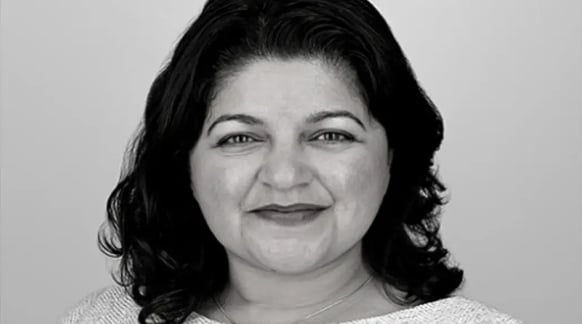Sadhana Bhide, subject matter expert at Faethm by Pearson
In our regular #MyFirstMcJob series, those at the top of their game remember when they were still at the bottom

Hi Sadhana! Who are you and what do you do?
My name is Sadhana Bhide and I’m the subject matter expert for strategic workforce planning at Pearson Workforce Solutions. I work with organisations on their strategic workforce planning approach and technology, and how we can support them to design, build and create their strategy and deploy it within their organisations.
What was your #MyFirstMcJob?
Working at the Body Shop at the Tottenham Court Road end of Oxford Street in London during my final year of university.
How did you get that job?
I was talking to a friend of mine saying, “Oh, I think I need to think about getting a weekend job.” She had a copy of a paper, looked through and said: “This looks good. Why didn't you go in and apply?” It was as simple as that. What did you have to do? It was a weekend job, so I guess I was what you’d call a customer service associate. My job involved interacting with customers, giving advice on how to use the products and completing transactions.
How long did you work there?
On and off, about a year and half.
What were the perks of the job?
Being on Oxford Street, we had lots of of interesting characters coming in, like actors and pop stars. We got to test the new things coming out, so that was quite exciting. There was a staff discount too.
Did anything particularly funny happen?
The Body Shop sell products around beauty, skincare, and hair care. If somebody asked you a question, for example: “What’s the best shampoo for me?” you were making a judgment about the state of their hair. You’d learn to be careful in making statements like: “I can see you've got terrible hair,” and they'd be like: “No, my hair's wonderful. What are you saying?”
Did anything else memorable happen?
I met the founder of the Body Shop, Anita Roddick. She was amazing. I was quite junior so the branch manager introduced us and she just went: “The displays look nice. Is it busy?” She was very pleasant.
What skills did you learn at the Body Shop that you still use today?
First and foremost, understanding what the customer needs and wants. So how to react and respond, how to be quick, efficient and deliver. That could be anything from processing payments to putting together a basket of goods. Ultimately the customer comes in to have an experience. They may want to get their stuff and get out. They may want to linger. Understanding those needs is the most important thing, which I think you could apply to any situation.
Why is alumni important?
I previously ran the Barclays Global Alumni Programme where I really got to learn and understand about the benefits of corporate alumni programmes. I’m part of the alumni from my education educational institutions. We recently had a get-together and it was so nice to meet and share experiences. In my current role, I look at strategic workforce planning, so the demand and supply of your workforce. The average tenure is dropping. People change jobs and careers a lot more. Your alumni population becomes ever more important as a potential source of talent, because they'll go away, learn new things, have different experiences then bring that all back, so their level of productivity is much greater.
What would happen if you went back and did a shift at the Body Shop today?
I'd probably get it all wrong because I wouldn't know anything in terms of what their products are. But I hope my skills around listening to the customer, understanding what they want and what they're looking for, would go some way to identifying those needs. And I’d have a chance to look at all the new stuff, which would always be fun.
If you could go back in time and give yourself one piece of advice, what would you say?
Enjoy being in the moment and take everything you can from it.

